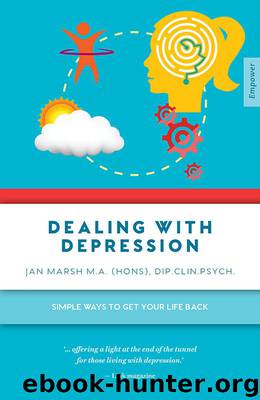Dealing with Depression: Simple ways to get your life back by Jan Marsh

Author:Jan Marsh
Language: eng
Format: epub
Publisher: Exisle Publishing Pty Ltd
MANAGE YOUR EMOTIONS
Understanding and managing your emotions are powerful skills for life. To some extent we have all done this in the process of growing up. As babies we cried and stressed about any discomfort, to alert our carers to our needs. As toddlers we threw tantrums when frustrated. We learnt from the reactions of those around us, and from our own responses, how to cope with discomfort and frustration and ideally how to ask for our needs to be met or find ways to meet them ourselves. As our brains develop, the prefrontal cortex grows into its role of evaluating and responding to our inner and outer worlds, integrating our experiences. Emotional regulation is a necessary skill for life and also a lifelong process, because there are always new experiences to integrate.
Here are some tips to make managing strong emotions easier.
1. Put words to your feelings
Identify ways of expressing what you are feeling. At first to yourself: ‘I’m getting anxious’, ‘It’s really frustrating being stuck in traffic when I have a meeting to go to’, ‘I love her’. Then to others about yourself: ‘I’m feeling ashamed that I didn’t do what I said I would’, ‘I love you’.
Develop a wide vocabulary of words for emotions and learn to understand how you feel in finer detail. A painter who only knows red, blue and yellow will create much less subtle work than someone who sees the differences in colours such as crimson, cerise, scarlet, brick, turquoise, cobalt, aqua, topaz, citrine and so on. If you have ever owned a big box of crayons you will know there are many more! So it is with emotions.
Are there some emotions you’re better at identifying in yourself than others? Many people find it hard to identify when they feel ashamed, for example, but easier to know when they feel anxious.
Can you separate similar emotions? For example, do you know the difference between jealousy and envy? This is a tricky one. Envy occurs when we lack something we see in another person. Jealousy occurs when something we already possess (usually a special relationship) is threatened by a third person. Sometimes both occur together, for example if you fear losing your partner to someone whose power and confidence you envy.
As you become more skilled at naming your feelings you will find that you can make more conscious choices about what to do with them. Even the labelling itself might reduce the intensity as you bring your powerful new brain, the cortex, into the mix, rather than operating solely from your old brain.
It is also important to be able to identify what someone else is feeling. Can you tell when your partner is feeling angry and scared rather than only seeing the anger? Is your co-worker’s abrupt tone of voice due to embarrassment? Using more specific labels instead of just saying ‘He’s in a bad mood’ will deepen the information you get in any situation and make it much more useful.
If it seems wise and safe,
Download
This site does not store any files on its server. We only index and link to content provided by other sites. Please contact the content providers to delete copyright contents if any and email us, we'll remove relevant links or contents immediately.
Should I Stay or Should I Go? by Ramani Durvasula(7652)
Why We Sleep: Unlocking the Power of Sleep and Dreams by Matthew Walker(6697)
Fear by Osho(4727)
Flow by Mihaly Csikszentmihalyi(4685)
Rising Strong by Brene Brown(4448)
Why We Sleep by Matthew Walker(4433)
The Hacking of the American Mind by Robert H. Lustig(4375)
How to Change Your Mind by Michael Pollan(4355)
Too Much and Not the Mood by Durga Chew-Bose(4337)
Lost Connections by Johann Hari(4171)
He's Just Not That Into You by Greg Behrendt & Liz Tuccillo(3889)
Evolve Your Brain by Joe Dispenza(3668)
The Courage to Be Disliked by Ichiro Kishimi & Fumitake Koga(3486)
Crazy Is My Superpower by A.J. Mendez Brooks(3397)
In Cold Blood by Truman Capote(3374)
Resisting Happiness by Matthew Kelly(3337)
What If This Were Enough? by Heather Havrilesky(3308)
The Book of Human Emotions by Tiffany Watt Smith(3300)
Descartes' Error by Antonio Damasio(3270)
